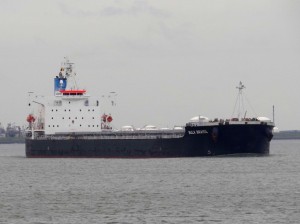DALY CITY, California — Twenty Filipino men were found to have no food on board a Panama-registered ship berthed at Port Kembla, in New South Wales, Australia.
The Australian Maritime Safety Authority detained the Bulk Brasil, on Thursday afternoon January 29. The ship is operated by Japanese Company Keymax and is full of Australian cargo bound for the UK, according to ABC.net.au.
International Transport Workers’ Federation (ITF) National Co-ordinator Dean Summers said the seafarers haven’t been paid since September.
“The shocking thing is that this company has signed agreements with our organization to say that they will pay an international minimum standard and yet haven’t bothered paying them for four months. Now this is the crisis, when the human element comes to the fore,” Summers told ABC.net.au.
“Over the past 20 years the ships have improved, but the quality of management and respect for seafarers is probably at an all time low,” he said.
Summers said the men need to be back paid and the Australian company who owns the cargo needs to be investigated.
“The Australian cargo owners, those that make profits selling their cargo to international markets, have to take responsibility for this,” he said.
“You can’t just put your cargo on the crappiest, cheapest ship, that doesn’t feed and doesn’t pay it’s seafarers and say it’s not your responsibility.”
“So we’re looking for the cargo owner and we’ll be holding them up to some responsibility in this as well.”
Summers said Japanese company Keymax is known to have had ships breach the Maritime Labour
Mission to Seafarers Australia says the 20 unpaid Filipino workers on board the Bulk Brasil is an all too familiar story.
The men are almost guaranteed to be paid now that AMSA and the International Transport Workers Union are involved, according to Reverend Dodd.
He said it is a big decision for a seafarer to speak out.
“The reality is that if seafarers do complain, it can be very difficult for them to ever get another job.”
